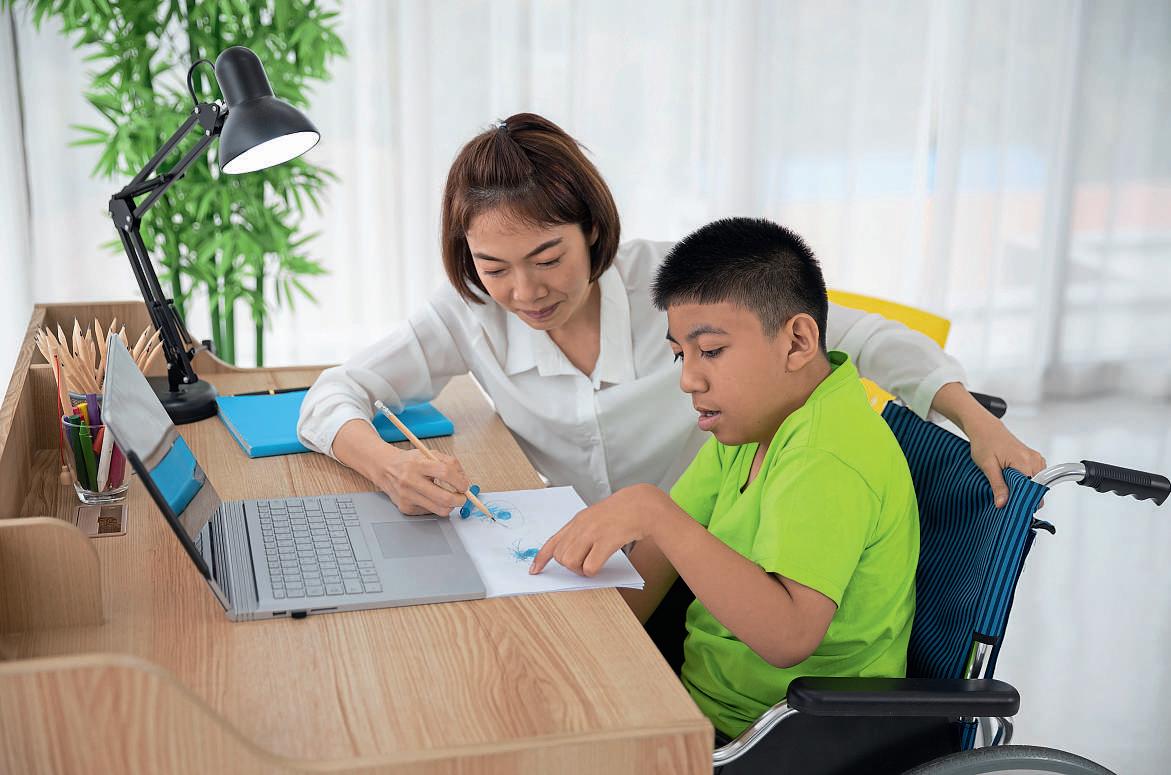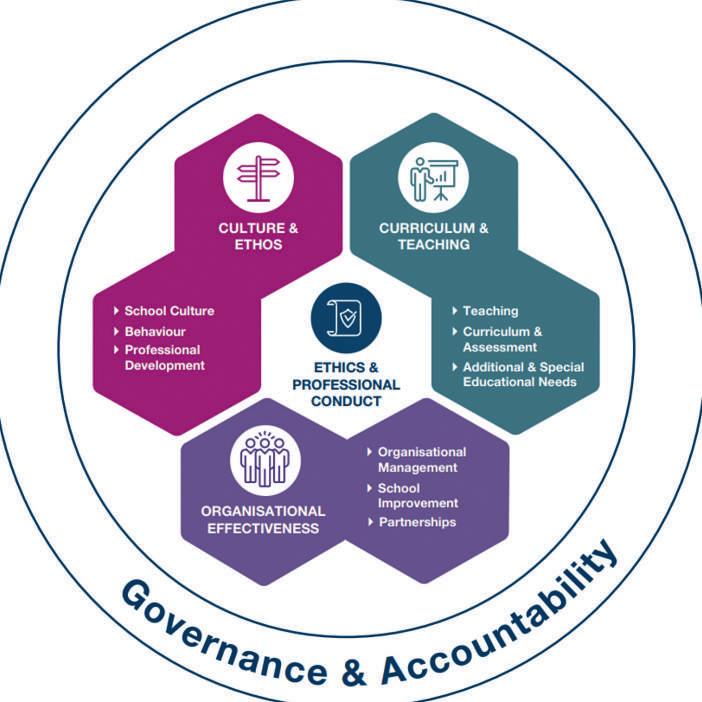
15 minute read
Building partnerships
by nasenCONNECT
42 / FEATURE ➜ SPOTLIGHT
Building partnerships
How can we build partnerships between parents and teachers in SEN during adolescent years? With this in mind, Professor John Sharry, CEO of charity ParentPlus, outlines the impact of its programme on service delivery, and examines the findings of Trinity College’s randomised trial.
etting parents engaged G in school life and involved in their children ’ s education brings many benefits for families and teachers. Research shows that higher parental engagement in schools improves educational outcomes, reduces absenteeism, boosts parents ’ confidence, and leads to improved behaviour at school and in the home.
However, establishing high levels of parental involvement is by no means easy; there are many barriers to overcome. These include family issues such as lack of parent confidence and stress and marginalisation, as well as school issues such as lack of clear policy, time and training.
In addition, though parents of children with learning disabilities often receive school support during the early years, this support often reduces during the adolescent years, when families can experience increased challenges. During adolescence, families may encounter issues with behaviour, communication and sexual problems, as well as difficulties promoting independence for their young person. Indeed, The National Disability Authority identified that parents need ‘access to interventions and educational programmes’ to overcome the many challenges that can be experienced by the young person and their families during this time.
Schools are usually the most important provider of support to families with children with learning disabilities. Strong collaborative relationships between parents and school staff are crucial in ensuring positive outcomes for children and young people.
There are many ways to improve parental involvement and to create good collaboration between schools and families, such as:
Increasing communication to individual parents as well as the whole parent group
Involving parents directly in school-based learning with their children
Ensuring parents fully participate in educational planning for their children
Involving parents in whole school decision making
Supporting parents with home learning and dealing with behaviour problems.
PARENTS PLUS SPECIAL NEEDS PROGRAMME
One important way to provide support to families and to increase collaboration between teaching staff and parents is to deliver school-based parenting programmes.
The Parents Plus Special Needs Programme (PPSN) was developed to respond to the complex, underserved needs of young people (12-25 years)
with a learning difficulty and their families. This seven-week parenting group can be delivered by teaching staff and multidisciplinary professionals in school settings to support parents to:
Manage behaviour and emotional problems
Deal with puberty, sexuality and relationships
Reduce their own stress as parents
Support their child’s education in school
Prepare their child for adulthood and future transitions.

As one parent who attended the course explains: “It is a constant fight for your child. This course is truly invaluable. For all services listening, please look into training in this course. There are so many families who need this now.”




EMPOWERING PARENTS AND TEACHERS TOGETHER
The PPSN also supports parents to be full participants in their child’s education and supports them to plan for the future. When delivered through schools, the PPSN increases parents’ involvement in the school and builds partnerships betwt een parents and school staff. Once the programme is finished, parents are encouraged to continue to meet in an ongoing parent support group (possibly via an existing school body such as the parents’ association), which can reach out and include new parents of children in the school.
Speaking of the impact of running PPSN, Ciara Ní Raghallaigh, Speech and Language Therapist at a Dublin school for children with learning disabilities, explains: “Delivering the programme in our school has transformed relationships betwt een parents and teachers. Directly supporting parents, and bringing them together in groups to support one another, has increased their involvement in the school and reduced stress on parents and families. Parents also feel more equipped to deal with the challenges that they face raising an adolescent with learning difficulties.”
BIO
FIRST INTERNATIONAL EVIDENCE-BASED PROGRAMME
Between 2019 and 2020, in a large randomised controlled trial with Trinity College Dublin Psychology Department, parents attending the PPSN Programme reported significant improvements in:
Parenting practices
Problem behaviours
Parental satisfaction
Self-efficacy
Goal attainment.
J O H N S H A R RY
Co-founder and CEO of the Parents Plus charity and co-developer of the seven evidence-based Parents Plus and Working Things Out programmes, Professor Sharry has 30 years’ experience as a mental health professional and was formerly principal social worker at the Mater CAMHS. He is an adjunct professor at the school of psychology in University College Dublin and has written 14 books, 10 intervention programmes and over 70 research papers and chapters. To learn more about training and mentoring for those who work in community, health, education, and disability services, and to learn more about ParentPlus visit www.parentsplus.ie or contact cherie@parentsplus.ie
44 / FEATURE ➜ SPOTLIGHT SPOTLIGHT


Dr Charlotte Wilson, of Trinityt College Dublin, who led the RCT, commented: “We know internationally there has never been a randomised controlled trial of a programme like this. The ParentsPlus Special Needs Programme fills the massive gap in service provision. ”



SPONSORSHIP OPPORTUNITY FOR PROFESSIONALS TO TRAIN IN THIS NEW PROGRAMME
Ecclesiastical Movement for Good and Parents Plus recently announced their grant partnership offering sponsored training places to professionals providing services to adolescents and young adults with learning difficulties, or their families, in the UK.
The partnership will see Ecclesiastical, the specialist insurance and financial services company, fund the training of these professionals in PPSN. The fund will enable Parents Plus to recruit, train, mentor and supervise 50 professionals from 25 services to deliver PPSN to parents. Professionals such as teachers, social workers, speech and language therapists, family support workers and many more can apply for this sponsorship opportunity.
This initiative will reach 1,500 families in the UK, helping parents to manage complex needs, improve their family ’ s well-being and strengthen their links with other parents.
Eleanor Kent, Social Worker with CAMHS, who has trained in, and runs the PPSN, says: “PPSN is without doubt the solution to the crippling problems that many parents of adolescents and young adults with a learning difficulty need. The programme will change the future for children with learning difficulties, their parents, their families and their communities. It should be compulsory and offered to every family. It really is that important.”
A P P LY F O R S P O N S O R S H I P
If you are a professional working with children, adolescents or young adults with a learning difficulty in the UK or are running a parent-led support group for families with a child with a learning difficulty and would like to apply for a sponsored training place on this programme, please email Cherie Tyner at cherie@parentsplus.ie Closing dates for applications for the first phase of sponsorship is Friday 2 April at 5pm.
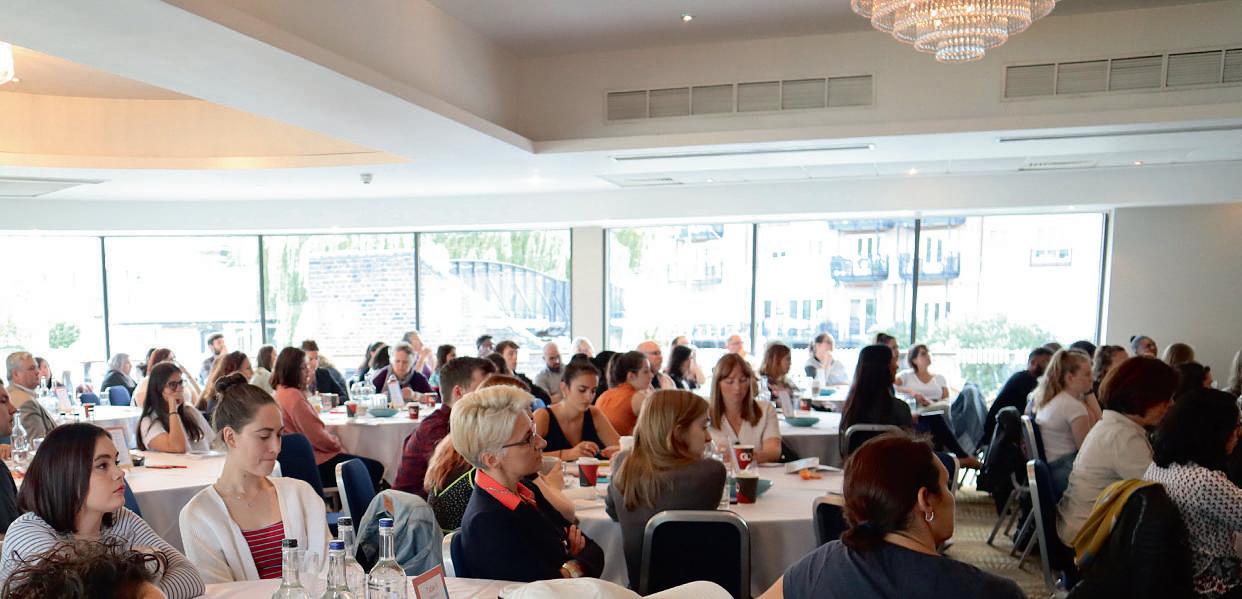

Ask theteam There is always a steady stream of questions arriving at nasen House and, of course, the Education Team answers them as soon as possible. But, while many of them are specific to a particular context, the answers to a number of them could be helpful to the wider nasen membership. ‘Ask the team’, formerly ‘Connect with Us’, provides the space to share these questions and answers.
If you have a question, the answer to which you think would be useful for everyone, please submit it to nasenconnect@nasen.org.uk Of course, you can always give nasen House a call too.
RELATIONSHIPS, SEX AND HEALTH EDUCATION
I’m a SENCO in a mainstream secondary school and I have been asked to deliver training on the new RSHE curriculum from the point of view of supporting SEND pupils before it becomes fully statutory in the summer term. Do you have any suitable resources to support this?
SENCO, East Ridings
In addition to nasen’s webinars on this topic, the Preparing for Adulthood website (https://bit.ly/3awG9E7) has a number of free resources to support relationships education, and the Sex Education Forum in association with Mencap and Image in Action have a guide for SEND (https://bit.ly/3ayH5bg).
Alternatively, membership of the PHSE Association gives access to a SEND planning framework and training webinars around the new statutory curriculum to support staff CPD (https://bit.ly/3au292v).

HANDWRITING
Due to the pandemic and remote learning having a digital bias, a large number of our secondary pupils have regressed in their handwriting quality and speed. Are there any age-appropriate handwriting interventions that can help address this?
English Lead, Northamptonshire
This is an interesting side effect of the remote learning during lockdown that Ofsted mentioned in its first review. It is difficult to learn to change your handwriting at an older age, though ‘Handwriting for Heroes’ aimed at veterans who have had to relearn to write with a non-dominant hand may be more age-appropriate for KS3 and KS4 pupils. The ‘Speed Up’ programme by Lois Addy has also been found useful for older pupils. In terms of improving speed, practise makes perfect and raising awareness of this with staff is key.

NEW SENCO
I recently completed my NASENCO and gained employment as a SENCO in a large secondary school. I am now the head of department with seven TAs and feeling a little trepidation at the level of need. Is there a way I can connect with other SENCOs in similar settings for support?
SENCO, South East
You are not alone! We created the SENCO Support Service to provide access to highquality support for this very reason. Our Whole School SEND service hosts the SENCO Forum which can help you to connect with SENCOs across the country with similar issues. If you need more personalised support, you can access the network of Regional Whole School SEND teams. Each region has a Regional SEND team to support prioritisation of SEND (https://bit.ly/2Oe3sdL). They may be able to put you in touch with others or signpost networks in your area.


Reviews

INCLUSIVE TEACHING IN A NUTSHELL: A VISUAL G UI DE FOR BUSY TEA CHERS
he wide range of needs that
Tchildren and young people can often present with and the ever-increasing number of resources being produced can combine to create an overwhelming situation for staff looking at the best ways of providing support.
Inclusive Teaching in a Nutshell delivers on its title and more. It provides a thoroughly comprehensive yet easily digestible guide through the fundamentals of inclusive teaching as well as more targeted strategies. The guide itself demonstrates many of the fundamentals that it discusses; it is highly visual, has a clear consistent structure, provides points for self-reflection and excellent summative diagrams. The ease with which readers can navigate the book to locate key information, illustrates how inclusive teaching strategies benefit everyone.
The book provides ideas and strategies that will work across a range of age groups and the eight themes provide a useful overview of where you can make the most impact through small changes; the classroom environment section is a particularly helpful section and an area that typically does not receive as much
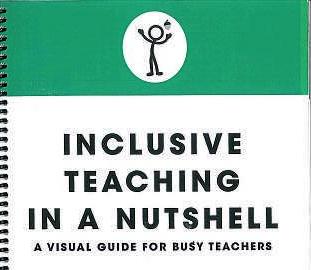
Publisher: Routledge Author: Rachel Cosgrove ISBN: 978-0-367-36325-3 Reviewed by: Jamie Galpin, Education Officer (CPDL), nasen
attention as it could. The format allows staff to ‘grab and go’ with specific ideas as well as opportunities for longer reflection of some of the jargon-free detailing of theory. Suitable for teachers and SENCOs alike, Cosgrove has cracked a tricky nut in producing such a useful and accessible guide.
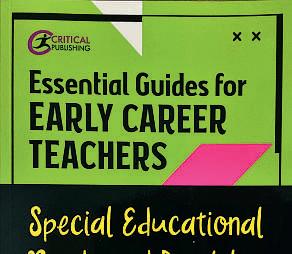

Publisher: Critical Publishing Author: Anita Devi (Series editor, Emma Hollis) ISBN: 978-1-913-06329-0 Reviewed by: Michael Surr, Head of Education (interim), nasen
ESSENTIAL GUIDES FOR EARLY CAREER TEACHERS: SPECIAL EDUCATIONAL NEEDS AND DISABILITY
As the title suggests, this book is one in a series of publications from NASBTT, aimed at early career teachers. Its structure is such that readers could dip in and out when looking for specific information, or work their way through the book if they wish to undertake a self-led programme of CPD.
The book begins with the fundamentals of SEND, by looking at topics such as the essential role of high-quality teaching, the graduated approach and the key principles contained within the SEND code of practice. The book then takes each of the four broad areas of need in turn. The structure of each of these sections provides an explanation of each need, what the implications of a need in each area might be, before moving on to consider practical ways to adapt teaching in order to support learners.
The book draws upon and refers to relevant research throughout, and at the end of each chapter, there are helpful suggestions for further reading. As well as providing information for readers, the book also includes reflective tasks to encourage them to consider their own practice and attitudes to SEND. Careful use is made of case studies to exemplify points being made. In order to help embed learning, readers are given practical tasks which are designed to be carried out over time.
The appendices include an informative ‘at-a-glance’ summary of the legislative developments around SEND from the 1940s to the present day and the Acronym Buster will help practitioners decipher the many abbreviations used in this field.
This book would make a useful resource not only for those that are newly qualified, but also for those more experienced teachers who wish to learn more about SEND.
Medpac
Medpac – practical bags specifically designed for carrying and storing prescribed and emergency medicines with personal photo identification.
edpac lets you store and transport medicines safely,
Mallows you to easily identify the correct medicine for the correct child and can save vital time in an emergency.
Every Medpac comes complete with a Medpac Photo ID and a Medpac Treatment Card to enable you to write clear instructions on how to use the medication and additional emergency phone numbers.
Medpac is the brainchild of Jayne Tarrant, a mum from Suffolk, who saw a need for such a product when her daughter was diagnosed with a condition that
Ideal for
required her to carry emergency asthma inhalers medicine with her at all times. and spacers, Epipens Not able to find a product to and Jext, Epilepsy and fulfil the need, Jayne set about Diabetic medication, designing and sourcing a product tablets and more. that would work in many situations.
To discover more about this innovative and affordable range of products, visit www.medpac.co.uk and see how Medpac could change the way you store the medicines in your school and ensure they are always organised and accessible in your setting, on school trips and at school clubs.
No minimum order value, five per cent discount on orders over £200.
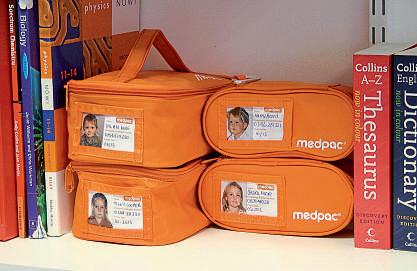
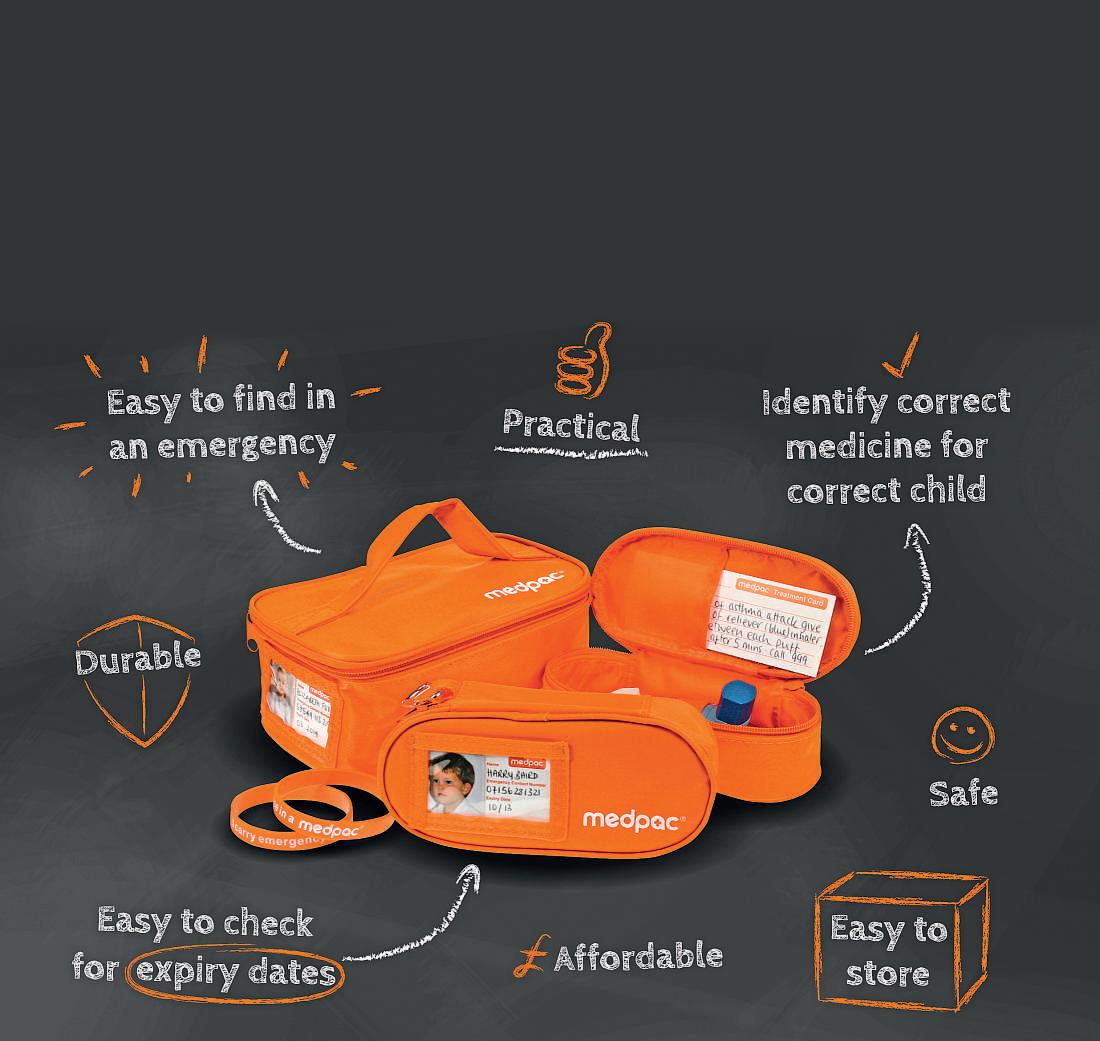


www.medpac.co.uk/pages/medicine-bags-for-school Tel: 0845 0739430 Email: sales@medpac.co.uk
EventsDiary
Whole School SEND: Being a research-engaged SENCO: primary focus Online, 22 March More details: https://bit.ly/3uOXmRl
SEND Conference 2021, All in this together: Making SEND Everybody’s Business
Online, 10 June, 9am-3.45pm More details: https://bit.ly/3lzOtWI
nasen: Understanding Social, Emotional and Mental Health Needs
Online, 18 March, 1pm –2.30pm More details: https://bit.ly/3psZquh
British Dyslexia Association, International Conference 2021 Online 20 – 21 May 2021 More details: https://bit.ly/2EgS0c2
Schools and Academies Show
Online, 27-30 April More details: https://bit.ly/3sL6X9X
nasen: Understanding school refusal and SEND
Online, 1 April 2021, 1pm-2.30pm More details: https://bit.ly/3prRedS

nasen webinars For the full programme and for details of the Webinar Pass, please visit https://bit.ly/2N6cHMf
Whole School SEND: Whole Class Reading – Access for All Online, 18 March, 4pm – 6pm More details: https://bit.ly/3pE22G4
World Education Summit 2021 Online, 22-25 March More details: https://bit.ly/3auxwd5
nasen: Social, Emotional Mental Health Needs in specialist settings Online, 25 March, 1pm-2.30pm More details: https://bit.ly/3vcZhPO
nasen: Understanding autism Online, 29 March, 1pm-2.30pm More details: https://bit.ly/3esEzFG
nasen: Working with minimally verbal autistic pupils
Online, 31 March, 1pm-2.30pm More details: https://bit.ly/3s0kz0w
nasen: Universal support: strategies for all
Online, 30 March, 1pm-2.30pm More details: https://bit.ly/3s5xWg1








